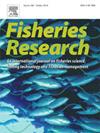收入不平等和社会经济因素对印度渔场足迹的影响:傅立叶增强ARDL方法
IF 2.3
2区 农林科学
Q2 FISHERIES
引用次数: 0
摘要
虽然许多研究调查了生态足迹的决定因素,但专门关注渔场足迹的研究仍然相对较少。本研究调查了1971年至2022年印度渔场足迹与主要社会经济因素(包括收入不平等、经济增长、能源消耗、贸易开放和城市化)之间的短期和长期联系。利用傅里叶增强自回归分布滞后(FAARDL)方法,我们评估了这些因素如何随时间影响海洋资源的可持续性。此外,使用完全修正的普通最小二乘(FMOLS)方法评估了研究结果的稳健性,并进行了因果检验。研究结果表明,收入不平等和城市化在短期和长期都减少了渔场足迹,这表明对资源的不平等获取和城市地区消费模式的转变缓解了对海洋生态系统的直接压力。相比之下,能源消费和贸易开放助长了渔场的退化,能源的使用对海洋资源的开发有很大的影响。为了减轻对印度海洋生态系统日益增长的压力,政策制定者应该优先考虑渔业的节能实践,促进可再生能源的采用,并执行更严格的贸易法规,以防止过度开发海洋资源。此外,通过包容性政策减少收入不平等的努力可以促进对可持续粮食来源的公平获取,同时最大限度地减少渔场的生态压力。本文章由计算机程序翻译,如有差异,请以英文原文为准。
Influences of income inequality and socio-economic factors on fishing grounds footprint in India: Fourier augmented ARDL method
While numerous studies investigate the determinants of the ecological footprint, research specifically focusing on the fishing grounds footprint remains relatively scarce. This study investigates the short- and long-term linkages among fishing grounds footprint and key socio-economic factors, including income inequality, economic growth, energy consumption, trade openness, and urbanization, in India from 1971 to 2022. Utilizing the Fourier Augmented Autoregressive Distributed Lag (FAARDL) approach, we assess how these factors influence the sustainability of marine resources over time. Furthermore, the robustness of the study's findings is assessed using the fully modified ordinary least squares (FMOLS) method, and a causality test is carried out. The findings reveal that income inequality and urbanization reduce the fishing grounds footprint, both in the short and long-run, suggesting that unequal access to resources and shifting consumption patterns in urban areas alleviate immediate pressure on marine ecosystems. In contrast, energy consumption and trade openness contribute to the degradation of fishing grounds, with energy use having a powerful impact on marine resource exploitation. To mitigate the growing pressure on India's marine ecosystems, policymakers should prioritize energy-efficient practices in the fishing industry, promote the adoption of renewable energy sources, and enforce stricter trade regulations to prevent overexploitation of marine resources. Additionally, efforts to reduce income inequality through inclusive policies can enhance equitable access to sustainable food sources, while minimizing ecological strain on fishing grounds.
求助全文
通过发布文献求助,成功后即可免费获取论文全文。
去求助
来源期刊

Fisheries Research
农林科学-渔业
CiteScore
4.50
自引率
16.70%
发文量
294
审稿时长
15 weeks
期刊介绍:
This journal provides an international forum for the publication of papers in the areas of fisheries science, fishing technology, fisheries management and relevant socio-economics. The scope covers fisheries in salt, brackish and freshwater systems, and all aspects of associated ecology, environmental aspects of fisheries, and economics. Both theoretical and practical papers are acceptable, including laboratory and field experimental studies relevant to fisheries. Papers on the conservation of exploitable living resources are welcome. Review and Viewpoint articles are also published. As the specified areas inevitably impinge on and interrelate with each other, the approach of the journal is multidisciplinary, and authors are encouraged to emphasise the relevance of their own work to that of other disciplines. The journal is intended for fisheries scientists, biological oceanographers, gear technologists, economists, managers, administrators, policy makers and legislators.
 求助内容:
求助内容: 应助结果提醒方式:
应助结果提醒方式:


